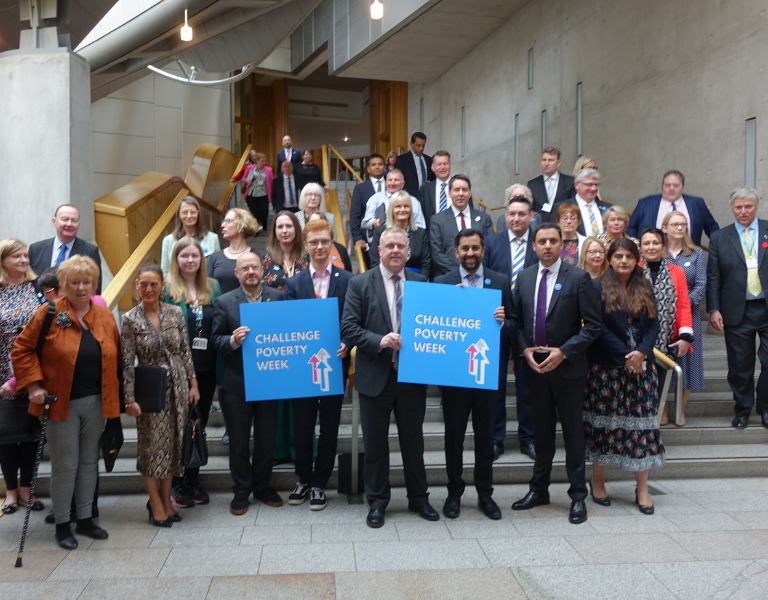
Ruth Boyle,Policy & Campaigns Manager,The Poverty Alliance
As Challenge Poverty Week comes to an end, with a weekend of rest and reflection, I think the anti-poverty movement can take pride in shining a light on the injustice of poverty in wealthy Scotland.
We know in the current climate, our members often feel like they are running from one thing to the next, without the time to consider our progress.
At the start of the week, Peter Kelly, the Poverty Alliance Director, reflected on the last 10 years of Challenge Poverty Week. His message was one of celebrating the progress that has been made, while recognising the challenges that still exist.
Challenge Poverty Week 2023 is my first since joining the Poverty Alliance in November last year. While I’ve participated in the campaign in the past, and recognised its importance to our shared ambitions to tackle poverty, I’m not sure I fully appreciated the breadth and size of Challenge Poverty Week.
Having seen the mobilisation of the Poverty Alliance membership, both during the months in the build-up and over the course of the week, I see more than ever that Challenge Poverty Week is a critical point in the year for the anti-poverty movement. The week is in diaries, in advance, across Scotland. Certainly, written in permanent marker rather than pencilled in.
Over the last seven days, the challenges Peter mentioned in his piece have once again been brought into sharp focus. The Joseph Rowntree Foundation’s Poverty in Scotland report concluded that we were not on track to meet our child poverty targets; that poverty is deepening; and the cost of living crisis is still here.
Poverty in Scotland also picked up on the problem of low pay and precarious work, themes continued in a briefing published by our research team, alongside Fraser of Allander and Inspiring Children’s Futures, into in-work poverty in the hospitality sector.
You can read more about the current poverty challenges in the excellent blog series on our website. Thank you to those organisations for sharing their evidence and experiences with us.
The continued challenges are no better emphasised to me than the Fife Gingerbread’s work to develop a Christmas story, in partnership with parents, foregrounding the importance of family and being together at Christmas. This comes after children reported that Christmas books don’t reflect the experiences of Christmas for families living on low incomes. This can’t be right in a wealthy country like Scotland.
We’ve heard this week from individuals and organisations about the loss of hope across Scotland that things can, or will, get better. As we sit in the aftermath of the Covid-19 crisis, and in the midst of a cost of living crisis which is continuing to bite, I can understand that. But, I leave Challenge Poverty Week all the more certain of the strength and energy of the anti-poverty movement to turn that tide.
We’ve heard from strong and unrelenting advocates for the structural solutions that we need to tackle the root causes of poverty in Scotland. Our daily breakfast briefings have allowed us to hear from organisations like the Scottish Council for Voluntary Organisations; Maryhill Integration Network; Glasgow and West Housing Forum; and the Trussell Trust on the action that is needed to build a Scotland free from poverty.
It’s clear that we know the answers, it is the pace and scale of that progress that needs to change. We’ll be continuing to push for the policy asks we developed for Challenge Poverty Week, alongside a working group, in the weeks and months ahead.
Social media has been awash with content on poverty; broadcast and print media has placed renewed focus on poverty with the voices of those living on low incomes being amplified in that coverage. Emma Jackson gave the BBC thought of the day to open the week, and Magic Breakfast launched a powerful video on the impact of poverty.
Events took place across Scotland, both in-person and online, to shine a light on particular aspects of poverty – like the Scottish Women’s Budget Group and Engender highlighting violence against women and women’s poverty. There was a focus on solutions at these events, like the Christian Churches event on the Minimum Income Guarantee.
Our members met with Cabinet Secretaries; the First Minister met with people living on low incomes to build better solutions to poverty; and MSPs gathered on the steps of Holyrood to raise their voice against poverty.
Schools have integrated poverty into lesson plans; the charitable arms of our football clubs have held collections for people in their communities; employers have shared their motivations for delivering fair work and the real Living Wage; faith groups came together with a joint statement on poverty; and business representatives have restated the importance of leadership in ending poverty.
At the Poverty Alliance, we know that Challenge Poverty Week is the accumulation and representation of the work that happens every single day in our communities. I believe that Challenge Poverty Week is a critical part of turning the tide, but we must collectively take forward this resolve and energy into our wider work.
I’d echo Peter’s opening blog that now is the time that we need to turn compassion and justice into concrete action. Despite welcome words of support from our political leaders, 10 years on from the first Challenge Poverty Week, there is too little progress in delivering changes that we urgently need.
The Challenge Poverty Week lecture, organised by the Poverty Alliance and SPIRU, was delivered by Torsten Bell of the Resolution Foundation who shared the markings of a strong anti-poverty strategy, something we will be reflecting on as we continue to push for change.
I look forward to embedding the evidence, stories and energy I’ve seen this week into our work to end poverty in Scotland. As we approach the Autumn Statement, the Scottish Budget, the interim child poverty targets, and get closer to the looming general election, it’s never been more critical that we continue to work together to end the injustice of poverty for good.


Enter your email address to receive regular e-updates about our work. If at any time you want to stop receiving these, simply contact us. We’ll keep your details safe and won’t share them with any other organisations for their marketing purposes. For full details see our Privacy Policy.